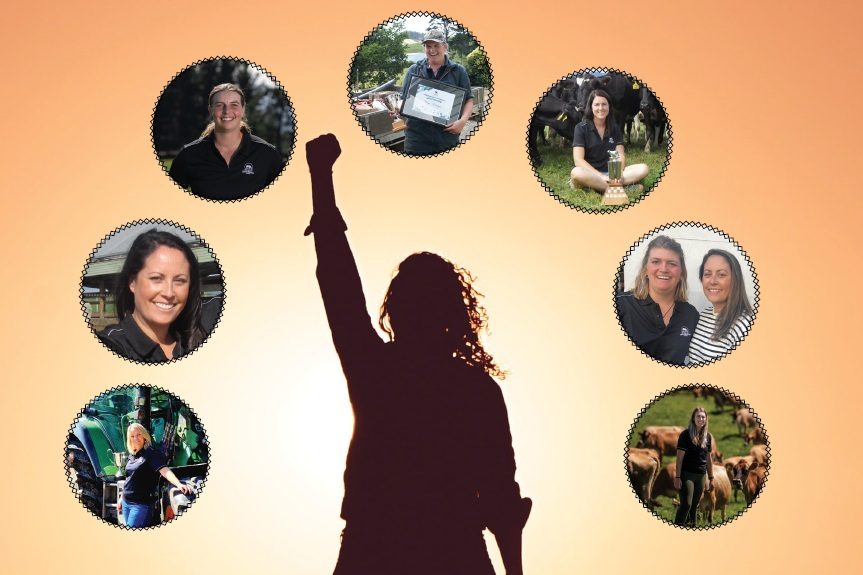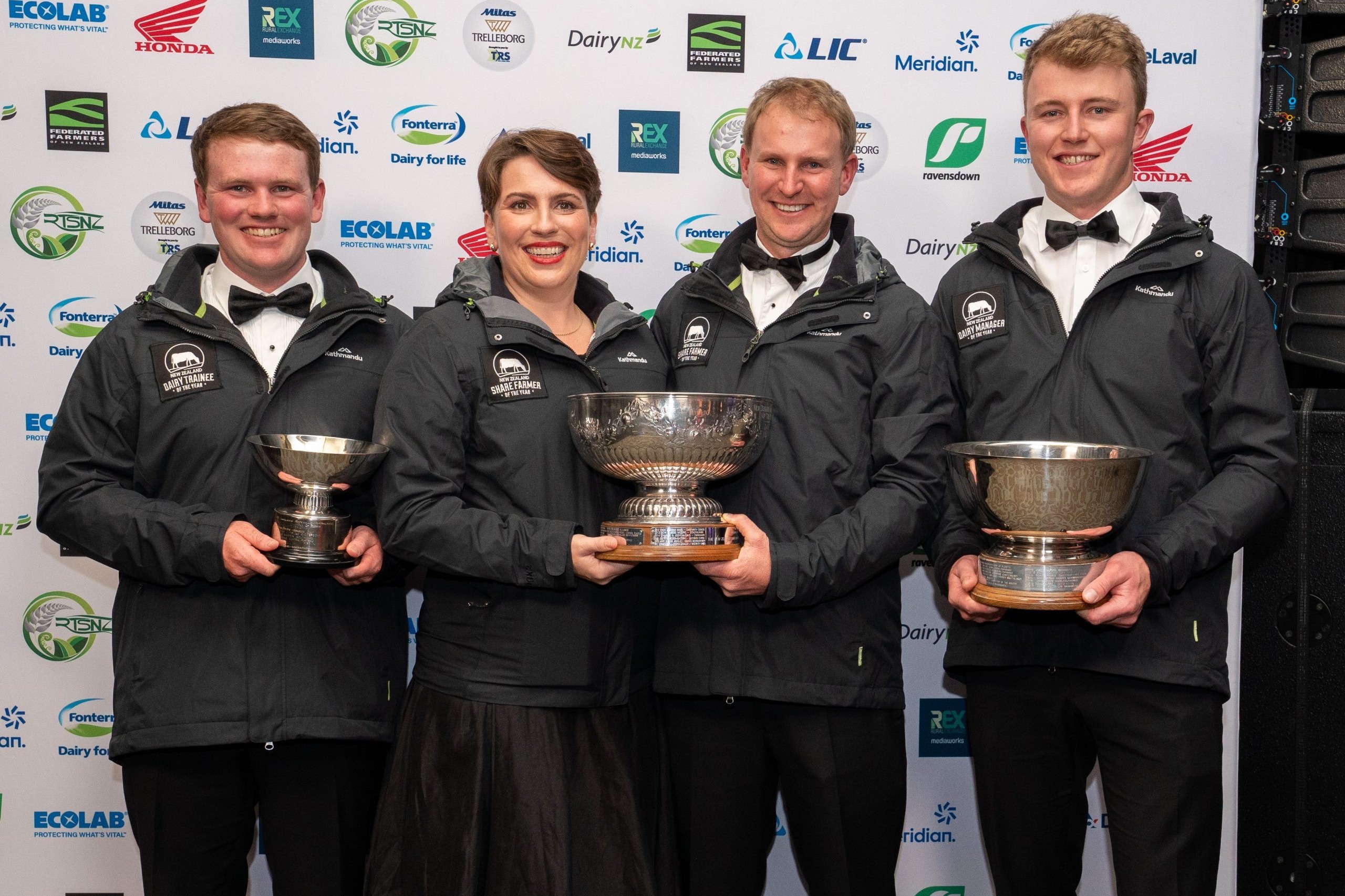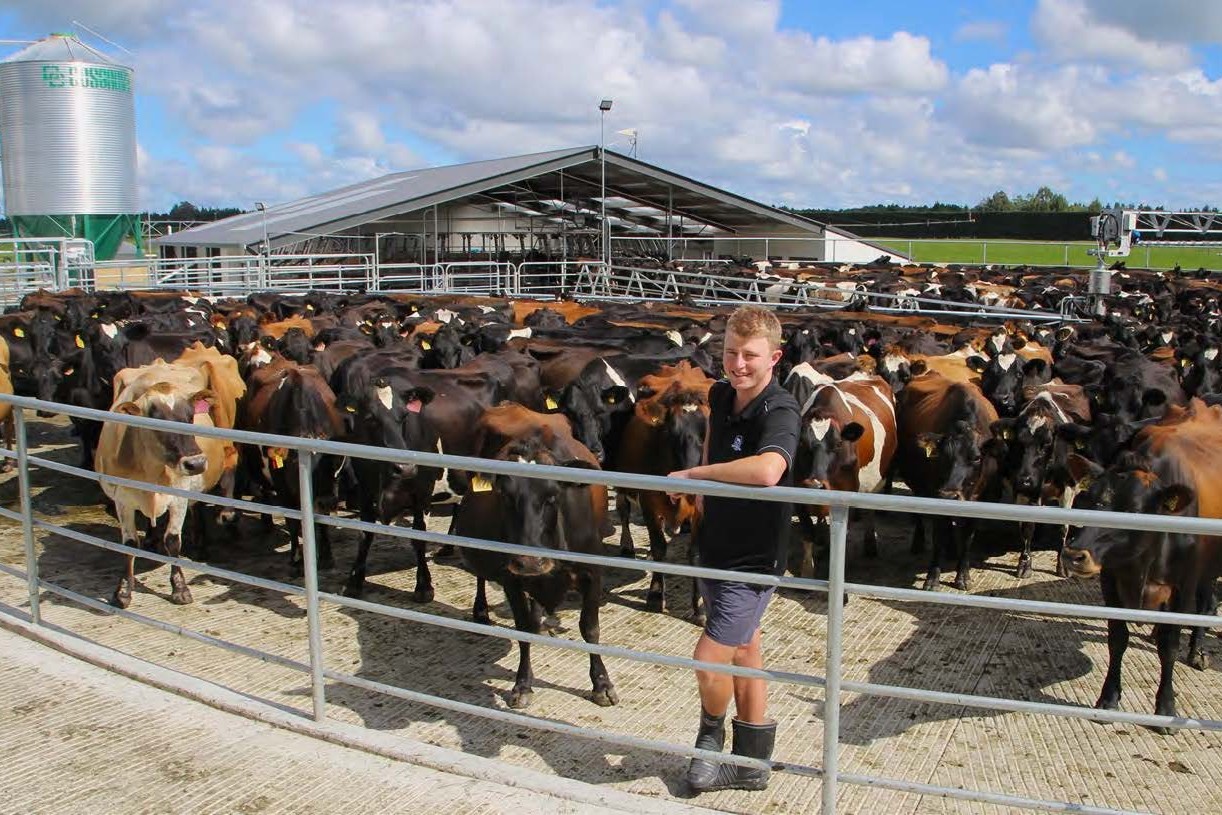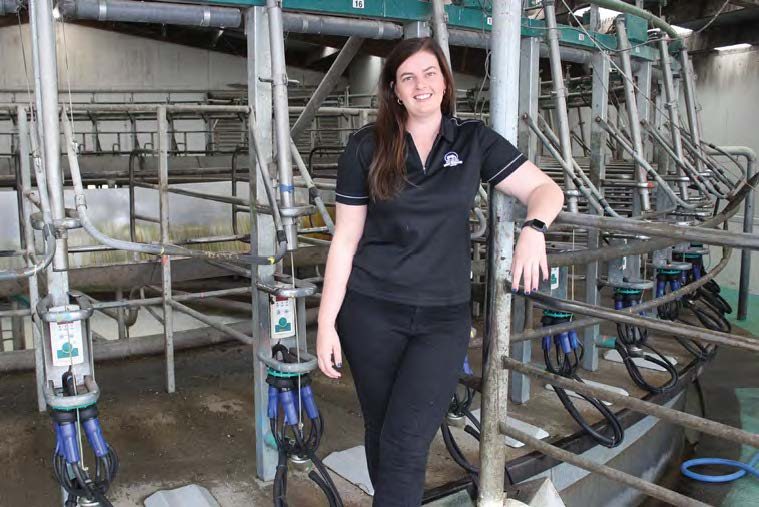Anne Lee
Just five years into their sharemilking equity partnership Ralph and Fleur Tompsett are already keeping the great New Zealand progression cycle rolling, finding ways to help their farm team grow alongside them.
The Hinds couple are this year’s Canterbury/North Otago Sharefarmers of the Year and have a passion for building up and bringing people along with them, having had similar opportunities from Ralph’s early employers now the couple’s business partners Ben and Mary-Anne Stock.
“One of the things I was really fortunate to enjoy was being able to buy livestock and lease them back and grow equity. That was part of our growth to get here.
“We’ve just tried to take that torch from the Stocks and propagate that through to our team, understanding that they are the future sharemilkers as well,” Ralph says.
They’ve been able to help a team member buy 30-bull calves from them so he could go on to rear them.
Another has grazed heifers with the couple’s youngstock, been able to grow his own equity and is now able to move onto a contract milking position next season.
“It can be challenging – very challenging in fact sometimes to find those win/win situations but it’s also so gratifying and exciting seeing people grow alongside us,” he says.
Ralph is originally from south Wales.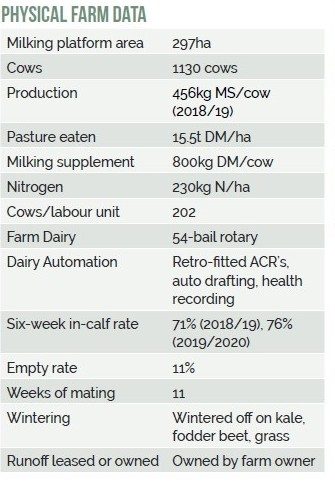
“I grew up on a small farm with 60 dairy cows and a few hundred sheep and farming wasn’t my first choice.
“I did a computer science degree but after three years decided that wasn’t the life-long career for me after all and so headed off travelling.”
New Zealand was on the itinerary and a month-long job for sharemilkers Ben and Mary-Anne Stock on the farm he and Fleur currently work and live on ended up lasting a year before he returned home and continued his new-found passion for dairying. In 2011 he returned and again went back to working for the Stocks and it was at a Hinds Young Farmers Club that the couple met.
Fleur, originally from a Canterbury sheep and mixed cropping farm, has bachelor’s degrees in both law and arts and, having worked in Wellington for ACC, headed off overseas for her OE and spent 3½ years working on luxury superyachts.
When she returned home to Canterbury she was asked to look after the bar one night at the Hinds Young Farmers event, and the rest they say is history – with the couple marrying last year.
Fleur worked in Christchurch for 18-months and then the Ashburton District Council but now works for ANZ in the agri-banking team.
The pair began, what they describe as, their 50/50 equity partnership in a 50/50 sharemilking position in 2015 when their business partnership took over the Stock’s sharemilking job on the 297-hectare farm owned by Craig and Susan and Karyn and Grant Fleming.
Before they took on the venture the pair carried out “a lot of sensitivity analysis” – not knowing a major nose dive in the payout lay ahead.
“We went down to $4/kg milksolids (MS), actually thinking that’s never going to happen – then it went to $3.90/kg MS.
“But we had great advice from a number of more experienced farmers and while it was very hard at the time, we’re proud of ourselves that we go through it,” Fleur says.
“I remember someone saying we’d have the sharpest pencil around at the end of it all,’ Ralph says.
The sharemilking venture structure meant as well as their share of payout, they had income from the management salary the partnership pays Ralph and lease income from cows they lease into the partnership.
Combined with Fleur’s off-farm income, the payments “helped smooth out the wrinkles through the downturn,” Ralph says.
Ben and Mary-Anne too have been fantastic support.
“They know our business and the farming operation inside and out – because this was their sharemilking job before us.”
They remain in close touch with the operation with bills coming first to Ralph and Fleur for coding before being sent to Mary-Anne for checking and then payment.
Ben, too, will step in and lend a hand if needed and is a great sounding board.
The level of financial scrutiny by both couples maintains a high level of financial discipline and focus on profitability.
Ralph and Fleur are evidence and data driven and look to science and well backed up factual information to inform their management practices.
“Driving up pasture eaten has been a goal with the main focus on measuring and assessing how we’re performing. We’ve had some success with that lifting it from sub 14t drymatter (DM)/ha to 15.5tDM/ha,” Ralph says.
They’d seen the DairyBase analysis DairyNZ had done that showed that for every extra tonne of DM eaten operating profit lifted by an average of $300.
Ralph says they’ve worked on better pasture management and feeding after calving to help drive intakes and strong demand and they’ve also focused on quality over quantity when it comes to pre-graze covers.
“We’re making sure we go into covers at the three-leaf stage and controlling those higher covers so the cows are really getting top quality feed every time.”
A concerted effort on tightening the calving spread, using short gestation length semen, intensive heat detection – both pre-mating and throughout the 11- week artificial insemination (AI) mating period has helped bring mean calving data forward by four days this season.
That’s helped with pasture management too, aligning demand more closely with supply of high-quality spring pasture.
More cows calving early also means more days in milk.
Their six-week in-calf rate has historically sat around 67% but lifted to 71% last year and hit 76% this past mating.
They’re close to hitting their empty rate goal of 10% too with this year’s at 11%.
Historically the herd’s production has averaged about 420kg MS/cow but last year it lifted to 456kg MS/cow and this season they’re on track for 495-500kg MS/ cow.
The extra production has come with about 200kg DM/cow of additional supplement that includes both wheat and palm kernel.
“We’re very aware though that extra production needs to be profitable production,” Fleur says.
Environmental goals are high on the priority list too and nitrogen use has been reduced by 50 units/ha with a slightly longer round length reducing the number of nitrogen applications throughout the season. The farm is located on heavier soils and pasture quality and soil compaction and pugging are managed through wet periods through a combination of standing cows off for short periods on the yard and on/off grazing.
Cows are wintered off in three groups based on body condition score and required weight gain by planned start of calving.
Cows are wintered on grass, fodder beet and kale on a 35ha adjacent support block owned by the Flemings.
They’re also arable farmers and heifers and youngstock are grazed on ex-ryegrass seed paddocks.
Ralph says their short-term goals are to continue to deliver on the targets the business has set for the farm owners, their business partners and themselves when it comes to both productivity and profitability. Their goals always include their own team too and it’s just as important for them to keep looking at how they can support them and help them spot opportunities.
They work a seven on two off, seven on two off and then seven on three off roster which the team are big supporters of.
They’re a bit of United Nations with team members from New Zealand, South Africa, Wales and Argentina.
Having a happy, well looked after team is a win/win with bonuses in onfarm productivity and efficiency.
Their core team members have been with them for three years and the couple say their success in the Dairy Industry Awards has been in no small way contributed to by their whole team.
Proper celebrations though will have to wait until the end of lockdown. Hearing the results by video was “pretty surreal – but we had a lot of support from our wider team in their individual trenches.
“It was hilarious to hear whooping and hollering from across the paddock when we were announced the winners.”
Question: What are your goals?
Answer: “One of our guiding principles is to dream big. To achieve something, you have to imagine it first.
“We want to own a farm within five to 10 years but we’re open minded about what that might look like so we can be open to any opportunity.”
Runner-up share farmers were Tania Riddington and Tim Murdoch from Culverden, and Jason and Miranda Armstrong from Darfield were third.


